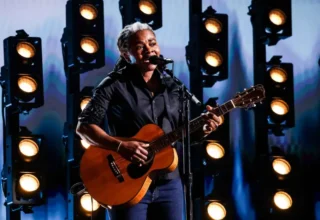
Condemned to 46 months behind bars, we look to find the measured response to Kodak Black’s latest trip to the penitentiary.
From mid-2016 onwards, the narrative surrounding Kodak Black underwent a notable shift. Within months of Drake co-signs and debuting on the Billboard Charts alongside French Montana with “Lockjaw,” the self-proclaimed Project Baby had the law nipping at his heels. Dogged by cases and controversies of varying severity, his symbiotic relationship with trouble formed a collective opinion that Kodak was either unwilling or incapable of making the necessary changes that’d lead to longevity in hip-hop.
For a fleeting moment, it seemed as though his release from jail in August 2018 had deterred him from getting chewed up in the gears of the system again. In the wake of dropping his acclaimed post-prison project Dying To Live,Kodak spoke to The Breakfast Club about moving to California and the self-preservation that governed his decision:
“I’m in Calabasas. It’s just different, positive. Ain’t too much black people there,” he said to the chagrin of Charlamagne. “In Florida, everywhere I go, people just like me. You is your environment so if everyone pack a nine, I’m gonna need to be on bullshit too. [I moved] as soon as I came home this time.”
Kodak Black at his “Dying to Live” album listening party – Johnny Nunez/WireImage/Getty Images
Predictably, this levelheadedness wouldn’t last and now we’ve arrived at the logical terminus for the 22-year old. As he doled out a sentence of 46 months— as opposed to the ten years that could’ve been imposed, the judge summarized why an extended period of incarceration had become a prerequisite at this stage:
“Young people do stupid things,” said Federico Moreno. “But the problem is that you’ve been doing stupid things since you were 15.”
Hidden away for the foreseeable future, the news come hot on the heels of reports that he’d hospitalized a correctional officer. But after the term was bestowed upon him, Kodak’s trademark braggadocio came to the surface in an Instagram post and its accompanying Kevin Gates quote:
“Hold It Down While I’m On Lock. Calling Shots From The Box #Literally ???”
Out of sight but still dwelling in the genre’s mind, the question turns to how hip-hop as a whole should respond to Kodak’s latest ordeal, if at all.
Depending on who you ask, the artist— real name Bill K Kapri— is either worthy of compassion or condemnation. Unapologetically brash, his infamous insistence that he’s “living for the moment” has done little to dissuade him from the wayward path that’s mould him. Since he came out the gate, Kodak’s hubristic claims of being “the best rapper alive” or surpassing Tupac and Biggie did little to endear him to any consumer base that went beyond his fervent supporters. And where Kevin Gates reciprocated Kodak’s nod to “RBS (Intro)” with unequivocal love and well-wishes, others have extracted glee from the court’s verdict.
Without a semblance of empathy for his plight, many have quantified Kodak’s four-year-bid as karmic retribution in full effect.
Reviled for his well-documented comments in regards to Nipsey Hustle and his widow Lauren London, the situation and ensuing calls for a boycott of his music made him a pariah in the eyes of countless fans and artists; to the extent that Dave East felt compelled to remove his feature from new record Survival.
“I just couldn’t have a song called ‘The Marathon Continues’ where I’m talking to my brother—and he’s on it—and a few songs before it, you know,” he told Big Boy. “But like I said, I don’t have no problems with homie.”
Stationed at a point in his career where his fellow artists are actively refraining from association, much like Bobby Shmurda and DaBaby have drawn a line under working with 6ix9ine, it paints a grim prognosis of what reception he’ll return to after this bid.
Projecting an outward refusal to accept culpability that came through in his half-baked apology to Lauren London, as well as storming out of his Hot 97 interview after Ebro brought up the sexual assault charges levelled at him, it raises the question of whether maturity and reflection are what’s needed to realign Kodak’s priorities.
Once again forfeiting the opportunities that the rap game has allotted him, his behaviour continues to fall afoul of the renewed perspective that has routinely seeped into his music. From 2017’s Project Baby 2 onwards, his lyrics have exhibited a cognizance of his upbringing’s encroaching effect on his mentality and the innate contradictions between best laid plans to change, and the lingering allure that his past still harbours. One minute, he’s defiantly staking his claim to be “Still in The Streets,” before lamenting over personal betrayals and optimistically claiming that “my watch got rocks, no more drug dealin” on tracks such as “Could Of Been Different.”
With a pronounced inner dichotomy on display, it seems that there’s at least part of the young artist that wishes to reform. Yet in the recent months since he was apprehended at Rolling Loud in Miami, that confrontational glint has remained present and would emerge on a new freestyle recorded from behind bars. Radiating that same destructive energy which has led some hip-hop consumers to cast him aside, Kodak Black’s jailhouse freestyle included bars that disparaged Southside and Yung Miami for good measure.
“I bought Yung Miami a ring, she wanted 808 baby, when I see her I’ma hit that bitch in her stomach. The way I keep my shit too real, they say I’m fucking up my money.”
As proven by that last couplet, Kodak Black isn’t ignorant of the detrimental effect that his conduct has on his standing in the industry. But as tracks such as “Transgression” prove, he feels powerless to change, no matter the cost.
“I hate I fell in love with thuggin’, I give my mama anxiety.”
With one foot still entrenched in Pompano Beach, there’s a reason why they call it the trap. A state of play that has led No Jumper’s Adam22 to claim he’s “disappointed in him,” Kodak’s reluctance to relinquish that chapter of his life once and for all is at odds with the rags-to-riches narratives that’s been perpetuated by hip-hop’s true greats.
From Hov to Pusha T, there’s no shortage of rappers that had once partaken in criminal enterprise to keep themselves afloat. In a modern context, Guapdad 4000 transferred his aptitude for credit card scamming to finessing the rap game, while A$AP Rocky has spoken about close calls:
“I never got in [the streets] too deep to the point where I let it get the best of me,” Flacko told MTV. “Everybody’s dream is to make it big with that shit and get out. I didn’t make it big so I got out.”
Kodak’s narrative, then, is nothing new. However, the difference is that for everyone from The Ferragamo Falcon to Freddie Gibbs, their criminal dealings were always a means to an end, something they would hope to one day let go. Where, in Kodak’s case, he’s regularly conducted himself with the same destructive attitude that he’d had when he was spending time in juvie. As a result, it makes you wonder whether it’s time to push Kodak’s clear-cut potential to aside, in favour of artists who are actively trying to better themselves (and we need not look any further than the rapper Kodak chose to quote on Instagram– Kevin Gates).
An open letter from the incarcerated Kodak contained a pearl of wisdom which suggests that he may have finally pinpointed which path to head down.
“4 Months Ago I Was Jus Facetiming Da Baddest Females On Planet Earth, Na Im Makin Jail Calls Waitin On Mail Call.”
But as we know from his lyrics, conjuring up a sentiment and sticking with a new outlook are two very different things. Plus, if he’s found guilty in the pending criminal sexual conduct case— which carries a maximum penalty of 30 years— it could be too little, too late. If not, there may still be time for Kodak to prevent himself from becoming an allegorical footnote that teaches MCs where the lines between a checkered past and a bright future must be drawn.
As has been made evident in recent years, the only person that can help Kodak is himself. Led into the waiting arms of the penitentiary once more, the only hope is for him to finally internalize what he rhymed back on Project Baby 2’s “Versatile.”
“Seem like I lost more than I ever gained
Ain’t get nun out these streets but pain
Ain’t get nun out these streets but hard times
‘Cause in these streets ain’t nun but hard times”
[via]







